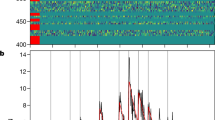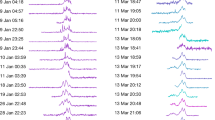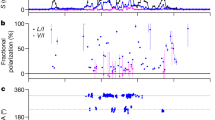Abstract
Observations of the decametric radio emission from Jupiter establish the existence of a hitherto undetected sub-millisecond component. Bursts of between 0.2 and 10 msec are not due to interplanetary scintillation but come from the planet itself.
This is a preview of subscription content, access via your institution
Access options
Subscribe to this journal
Receive 51 print issues and online access
$199.00 per year
only $3.90 per issue
Buy this article
- Purchase on Springer Link
- Instant access to full article PDF
Prices may be subject to local taxes which are calculated during checkout
Similar content being viewed by others
References
Douglas, J. N., IEEE Trans., AP-12, 839 (1964).
Slee, O. B., and Higgins, C. S., Austral. J. Phys., 19, 167 (1966).
Bigg, E. K., Nature, 203, 1008 (1964).
Riihamaa, J. J., Nature, 212, 1338 (1966).
Gordon, M. A., and Warwick, J. W., Ap. J., 148, 511 (1967).
Warwick, J. W., Space Sci. Rev., 6, 841 (1967).
Cohen, M. H., Gundermann, E. J., Hardebeck, H. E., and Sharp, L. E., Ap. J., 147, 449 (1967).
Author information
Authors and Affiliations
Rights and permissions
About this article
Cite this article
SLEE, O., GENT, H. Decametric Radio Emission from Jupiter. Nature 216, 235–238 (1967). https://doi.org/10.1038/216235a0
Received:
Issue Date:
DOI: https://doi.org/10.1038/216235a0
This article is cited by
-
Short-lived Jovian decametric events observed with an acousto-optical radio spectrograph
Earth, Moon, and Planets (1987)
-
S-bursts in Jupiter's decametric radio spectra
Astrophysics and Space Science (1977)
-
Physical Sciences: Fine Structure of the Jupiter Radio Bursts
Nature (1973)
-
Spectra of Jovian Millisecond Pulses
Nature (1968)
Comments
By submitting a comment you agree to abide by our Terms and Community Guidelines. If you find something abusive or that does not comply with our terms or guidelines please flag it as inappropriate.



